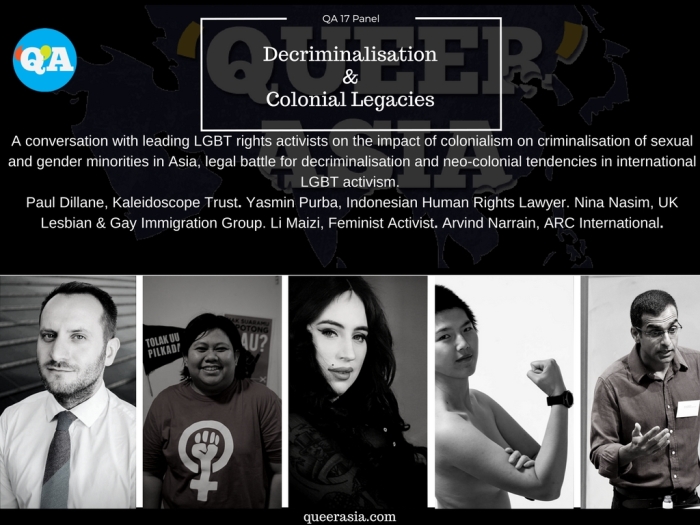
QA17 day 2 opens with an impactful panel featuring activists and human rights defenders working for decriminalisation in different forms in different countries in Asia. As the UK celebrates its 50th year of decriminalisation of homosexuality, this panel examines the different colonial, governmental and societal forms of criminalisation still imposed on queer people in Asia.
Chair: Arvind Narrain, Geneva Director, ARC International
Arvind Narrain is a founding member of the Alternative Law Forum in Bangalore, India, a collective of lawyers who work on a critical practise of law. He has worked on human rights issues including mass crimes, communal conflict, LGBT rights and human rights history. He has been a part of many fact-finding reports on sexual minorities in India and was also part of the litigation team, which argued the constitutionality of Section 377 before the High Court and the Supreme Court.
Arvind’s association with advocacy at the international level has involved significant collaborative work at the Human Rights Council and he has seen first-hand, how international and domestic advocacy can be mutually reinforcing, and how international instruments like the Yogyakarta Principles have a role to play in domestic litigation.
Panelist: Paul Dillane, Executive Director, Kalideoscope Trust
Paul Dillane is Executive Director of Kaleidoscope Trust, a leading NGO working to advance human rights and inclusion for LGBT people internationally. Founded in 2011, Kaleidoscope Trust partners with 35+ organisations in countries where LGBT people face discrimination, criminalisation and persecution. Following a career in law, Paul worked for six years as a human rights and refugee law specialist at Amnesty International UK.
Paul is a leading expert on the protection of LGBT refugees and was the Executive Director of UKLGIG, a London-based NGO working to provide practical support to LGBT people fleeing persecution, between 2014-17. Paul has also worked as a consultant and trainer for the UK Foreign & Commonwealth Office (FCO), UN High Commissioner for Refugees (UNHCR), Council of Europe, ILGA-Europe and Transgender Europe.
Panelist: Yasmin Purba, Indonesian Human Rights Lawyer
Yasmin Purba is a human rights lawyer, who has been working in the fields of human rights, justice and development for more than 14 years. She is currently an expert member of the Arus Pelangi, a prominent civil society organization focussing on the advocacy of the human rights of the LGBTIQ communities in Indonesia. Additionally, she is also assisting the UN Human Rights Working Group in Indonesia to develop a framework of human rights based indicators for the localization of SDGs in Indonesia.
As a human rights lawyer and lesbian herself, Yasmin Purba has been actively involved in various works both in advocating the rights of LGBTIQ people, as well as strengthening the capacity of LGBTIQ communities in Indonesia.
Panelist: Li Maizi, LGBTQIA Activist and Performer
Li Maizi has worked for several years in advocacy for women’s and LGBTQIA+ rights in the People’s Republic of China. Since 2012 she has become known for organising public performance art-style protests calling attention to gender equality issues. She was detained by the police on the eve of International Women’s Day in 2015, along with five other activists, for protesting sexual harassment on public transport, which led to an international campaign to demand their release with the hashtag #feministfive
Panelist: Nina Nasim, LGBTI Asylum Seeker Support Worker, UKLGIG
